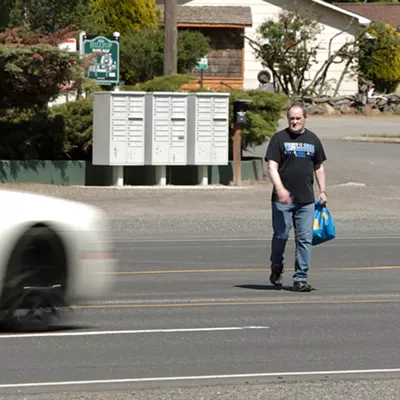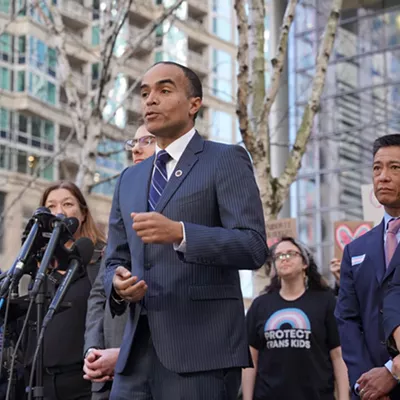
A former Camp Hope security guard just lost his job because of an affidavit he says the City of Spokane pressured him into signing — and filed without his consent this week.
Timothy Morgan’s four-page declaration — one of dozens filed by the city on Monday as part of a new legal effort to shut down the homeless camp — paints a pretty bleak picture. It describes prostitution, assaults, stolen vehicles, meth and fentanyl sales, guns, human trafficking and rape.
The affidavit doesn’t just describe the crimes he saw at the camp — it also includes the names of alleged perpetrators. The document contains six full names and more than a dozen first names or nicknames tied to crimes that include rape, assault and selling “girls off as if they were property.”
But here’s the issue: Morgan says his affidavit, written last fall when he was a security guard, no longer paints an accurate picture of the camp, and that the city filed it without his knowledge or approval. What’s more, Morgan tells the Inlander that he felt pressured to sign it in the first place.
“I felt obligated, I felt kinda forced into it. But I did as I was requested because I tend to do so, so I keep my job. I have a family to support,” says Morgan, who escaped homelessness in 2016 and now rents an apartment with his wife and three children.
The declaration was written in August and September last year, and signed in December, Morgan says. It reflects a Camp Hope that was significantly larger and more chaotic. When the city asked him to sign a copy again in January, he says he refused.
The city went ahead and used the one from December without telling him.
In November last year, Morgan had left his gig as a security guard to start with Revive Counseling, which does peer support at Camp Hope. It was going well, but on Thursday, he says Revive fired him because of the affidavit filed this week, which names some of the clients Revive works with.
He’s just one of the people caught in the middle of an ugly legal battle between the City of Spokane and the state of Washington over how to properly close the camp.
Now without a job and at risk of homelessness again, he’s worried about his family’s safety and wonders what could happen if the people he accused come after him.
“I have to worry about my family’s safety, I have to worry about protecting them,” Morgan says. “Who’s gonna get mad? What’s gonna happen?”
It’s not just Morgan’s reputation that’s now at risk.
Those accused of crimes are also named in the now-public court documents, and it’s unclear to what extent the city tried to verify the allegations against them before filing the documents. Morgan says some of the allegations were based on things he saw personally while working as a security guard last fall, but some of it was based on things he heard from others.
City attorney Lynden Smithson is still looking into what happened, but he says his office might look into changing its policy for redactions.
“Maybe in the future, when we are pursuing these declarations, we’d be a bit more mindful that maybe we either redact or don’t use names,” Smithson says.
Smithson adds that he doesn’t know if there was any investigation to try to match the allegations to police reports.
“I don’t think that occurred, and maybe that’s something that needs to be done in the future as well,” Smithson says.
The declaration also included the full name of a woman who was allegedly raped at Camp Hope. Smithson says he doesn’t know if the city made any effort to contact her.
Morgan says he’s already been called by one of the people named in the declaration. He didn’t want to go into details, but says the person was incredibly angry.
Smithson says he understands Morgan’s concerns about retribution, and says retaliation is a common concern he hears as an attorney, but rarely something he sees happen.
However, Smithson says he feels awful about Morgan losing his job. He says his office had no idea that could happen, and that he’s planning to talk to Morgan and will try to explain the situation to Revive.
Morgan is now on the other side of the fight. He’s working with the State Attorney General’s Office, which filed a series of affidavits on Wednesday in response to the city’s lawsuit. One of those is from Morgan, stating the information in his affidavit for the city is “stale” and not consistent with what he observes at Camp Hope today.
“The site is not a lawless zone, rather it has evolved to a more orderly system contained by a fence, with check-ins, a badging system and a dwindling population,” the affidavit reads.
But now Morgan just feels like everyone is using him.
“I fear for the sake of myself, I fear for the sake of my family, I want to know that I can take care of them and I feel like I’ve been put in a spot by the city and the state where I can’t do that,” Morgan says. “And I guess my only question is why? Why do I deserve that? Why does my family deserve that? We’re not doing anything wrong.”
Morgan’s declaration was part of the city’s latest attempt to close Camp Hope, which sits on land owned by the state of Washington. The state has been working for months to move people out, but there’s no clear timeline for when that work will be finished. There are just 65 people staying there now, compared to 467 in October and an estimated 600 last summer. The city says things are moving too slowly, and that the camp is a safety threat that needs to close soon.
On Thursday afternoon, a Spokane County Superior Court judge granted the preliminary injunction sought by the city, which Smithson says compels the state to take firmer action to stop the drug use occurring on their property. The judge also ordered the city and the state to get together and work on a firm plan to close the camp.
Smithson says the city is “super happy” with the judge’s decision. The next hearing is set for April 19.
The story of how Morgan got tangled up in the legal mess is complicated. It started in August, when Camp Hope was near its peak, with close to 600 people.
At the time, Morgan was patrolling the camp as a security guard with Crowd Management Services, which is under contract with the city, and he would regularly see and hear about criminal incidents. He’d sometimes pass on the information to the police officers who were stationed outside the camp. Sometimes he passed on information at the request of camp residents, who wanted police to know but were worried about telling them directly because they had warrants out for their arrest.
Some time in August, Morgan says CMS told the security guards that the city was asking for information about what was happening at the camp. Morgan wrote a letter titled “Camp Hope Documentation” that detailed crimes and names of suspects. The city drafted a declaration with the information he gave them, Morgan says.
In October, Morgan left his job at CMS and started working for Revive in November.
It wasn’t until Dec. 8 that Morgan says the city reached out to him and asked him to sign the declaration written based on the information he provided in August and September.
Even though he no longer felt it accurately represented the state of things at Camp Hope, Morgan says he felt “forced to cooperate” with the city because the declaration had been drafted while he was working for CMS, which was being funded by the city. He says someone from the city attorney’s office later told him it probably wouldn’t be used because the legal situation was changing. The lawsuit it was meant to be filed in – which was brought on behalf of camp residents to stop the city from sweeping them out — was later dropped.
In early January, Morgan says the city reached out to him, asking him to again sign the declaration for a new lawsuit. Morgan, who had been working with Revive for months at that point, said no.
Still, Morgan says both the declarations he signed — the one for the city and the more recent one for the state — are accurate. The one for the city shows Camp Hope in September. The one for the state shows Camp Hope now — smaller, safer and more controlled.
Along with several current or former camp residents, the affidavit Morgan wrote last year also named Julie Garcia, cofounder of Jewels Helping Hands, the main service provider on the ground at Camp Hope. Morgan accused her of letting violence committed by people she likes slide.
But Garcia says that getting anyone removed was a nightmare that could take months, and that cops generally refused to step foot in the camp to help them remove criminals.
“We have literally begged them to please come help us remove these folks,” Garcia says.
Police are stationed outside Camp Hope in daily shifts, but have previously said they tend to avoid going into the camp because of safety issues and jurisdiction concerns about trespassing people.
Garcia is sympathetic to the position that Morgan was put into.
“He has been used by the city as a pawn,” Garcia says. “I just spoke with the city attorney. I explained to him, ‘You really need to be careful when you’re asking someone in that position to give you names.’”
Daniel Walters contributed reporting to this story.

























